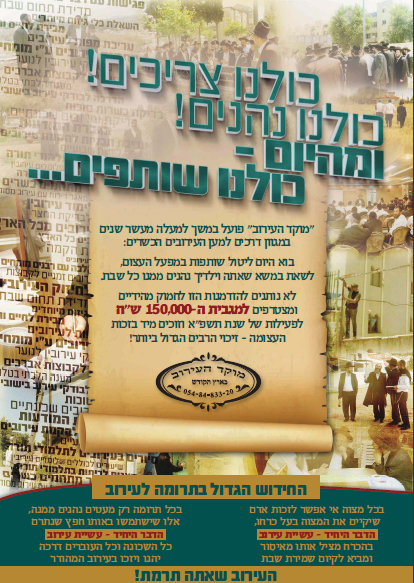תיקוני עירובין גליון 258#
גליון שאלות הלכתיות המתחדשות מידי שבוע בבדיקת העירובים השכונתיים
Reprinted with permission.

Reprinted with permission.

Source: Koheles passim
Enjoy them all!
See all material from this author: אומן בירושלים Uman In Jerusalem
From Rabbi Sternbuch’s Ki Savo parsha sheet:
UPHOLDING THE TORAH
Cursed be he who does not uphold the words of this Torah (27:26)
The Ramban cites a Yerushalmi (Sotah 7:4) that states that even someone who has learned, taught,
and observed the mitzvos, but is in a position to uphold the Torah and does not do so, is subject to this
curse. The Ramban explains that this includes anyone who has the power to uphold the Torah against
wicked people seeking to breach it but does not do so. This includes not preventing them from committing sins when we are able to, and — as noted by Rav Moshe Schneider — protesting against
anti-religious acts, especially in times like ours when people seek to uproot religion. He added that the
very act of protesting has the effect of “sweetening” (being “mamtik”) i.e. overturning, or at least
mitigating, dinim (decrees stemming from the trait of justice).Rabbonim who are able to, yet do not, stem the tide of secularization and heresy will not be spared
from this curse, notwithstanding how much Torah they have spread to those who are already observant.Conversely, the reward of those who refuse to make peace with the status quo, fight against anti-
religious measures, and engage in activities that strengthen the Torah and their spiritually weak brethren, is increased manifold, and they will enjoy the blessings set aside for those who uphold the words of the Torah.
From Wikipedia:
[Rabbi Kamenetsky] was an advocate for English-language sefarim, even commenting that quality English-language sefarim will be used by Jews in the Messianic era as, like Yiddish in its time, “today English has become a language of Torah.”
(Quoted by Rabbi Nosson Scherman.)
Glad to hear I’m not alone…